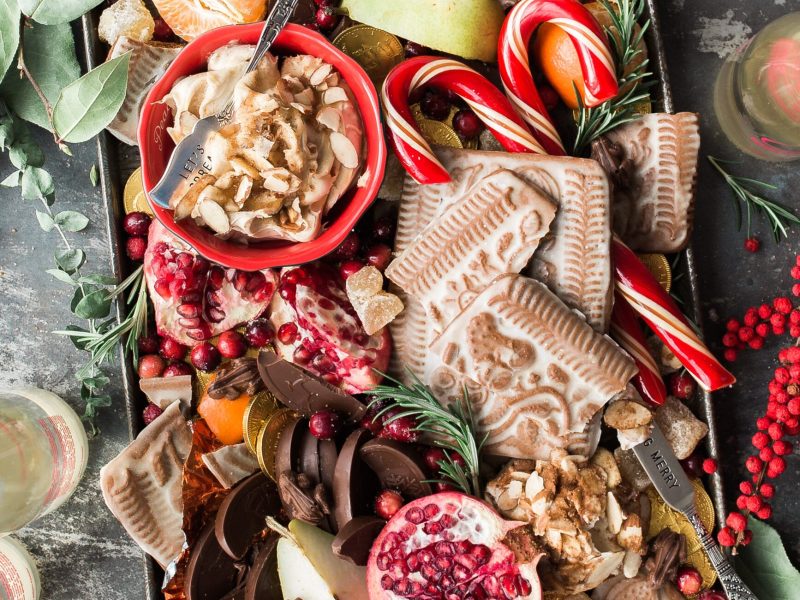
Prawn and Aspargus Sheet Pan Dinner
Ingredients: Green Prawns (200g per person) Asparagus (10 spears per person) Garlic Lemon Juice Extra Virgin Olive Oil Method: On a baking sheet place the

Smoked Salmon and Runny Poached Eggs
A lovely start to Christmas morning but unfortunately runny eggs, hollandaise and smoked salmon are a big no no during pregnancy because of the risk of listeria. Listeria is a bacteria which can cause listerosis – an illness that can be harmful for your baby and in the worst cases can cause miscarriage or stillbirth. Instead, opt for smoked salmon that has been heated to piping hot OR try replacing the with well cooked bacon or avocado. Eggs are still an option as well – just make sure you cook them until the white is completely set and the yolk is firm. I personally love a smoked salmon omelette that has been cooked through to start off my mornings.
Seafood buffet
This is one of my favourite meals – unfortunately pre-cooked prawns, raw seafood, and oysters all carry with them a risk of bacteria including listeria, tapeworms and other parasites. Instead opt for cooked prawns or fish that is piping hot when you eat it. To make sure your seafood is cooked through make sure it’s reached a temperature of at least 65 degrees, alternatively ensure your fish is opaque and scallops and prawns are firm to the touch.
Keep in mind that you need to limit the amount of some types of fish you eat during pregnancy because they can be high in mercury, which can affect your baby’s development. Shark/flake, marlin, swordfish and orange roughy should only be eaten once per fortnight ensuring your serving size is around 150 grams.
Turkey and Ham Hot Lunch
The good news is that you can enjoy your roast turkey and roast ham for Christmas lunch. Just make sure both meats are piping hot (above 71 degrees celcius) so that all the bad bacteria that can lurk in meat are killed off. A few other things to note include:
Cold meat platter
Cooked/salted meats that are available at the deli including salami, ham, prosciutto, pastrami and chicken may be contaminated with listeria, salmonella bacteria or toxoplasma parasites. The best thing to do with these is avoid them during pregnancy. But, if you’re desperately craving them, you could try baking them until they’re piping hot. Remember if you’re eating meats that were previously cooked and then stored in the fridge you need to make sure you use them within 24hours from when they were first cooked.
Christmas salads
Salads are a great option for Christmas lunch but it’s important to ensure you’re having a freshly made salad and not consuming any of the prepared salads that you can purchase at the shops. Ensure all the vegetables and fruit are washed well because toxoplasma bacteria can lurk in soil making these healthier options potentially infectious. Also ensure you check that any salad dressings, such as mayonnaise, don’t contain raw egg. Salad dressing from supermarkets are usually pasteurised to kill any bacteria so they tend to be the safest option over your aunties special salad dressing!
Dessert
There are lots of yummy options for dessert on Christmas day. I personally love the seasonal fruit in Australia and for me the cherries are my go to with some custard on Christmas day (and night). It is important to be aware that soft-serve ice-cream is not safe to consume during pregnancy because salmonella bacteria can lurk in the equipment. Home-made custard is another one to be aware of because it’s important to ensure the eggs are fully cooked to at least 71 degrees. The safest option for pregnant women would be to consume store-bought custard and frozen ice-cream.
Have any questions? Just send me an email at hello@womensnutrition.com.au or drop me a message on Instagram @womens_nutrition_ I’d love to help you navigate your pregnancy and clear up any food safety misconceptions you may have during your journey to motherhood.

Ingredients: Green Prawns (200g per person) Asparagus (10 spears per person) Garlic Lemon Juice Extra Virgin Olive Oil Method: On a baking sheet place the

I love these burgers because they’re so easy to make and they’re absolutely packed with nutrition to boost your fertility journey. Having some red meat

What is an AMH test? The AMH test, short for anti-mullerian hormone test, measures the levels of anti-mullerian hormone (AMH) in your blood. Both men

Veggie Loaded Bolognese This veggie loaded bolognese is high on the rotation list at our house. It’s packed with incredible nutrients to help support your
Appointments are available online or in person.